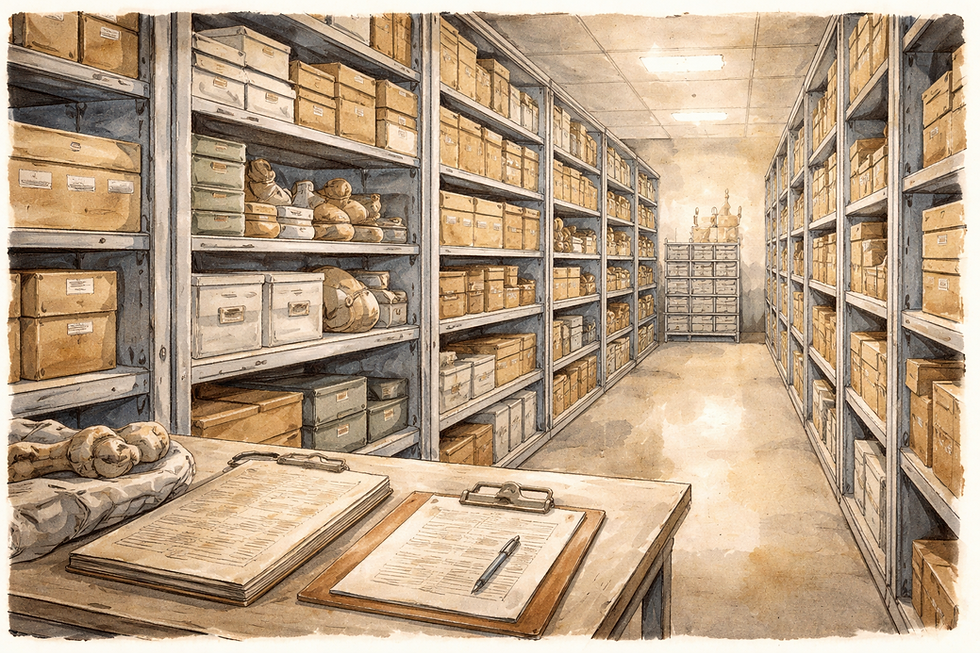What does Anti-Racism mean for the Museum Sector?
- Livi Adu

- Dec 27, 2023
- 4 min read
The Museums Association’s definition of an Anti-Racist museum is an institution that comprehends the complexities of racism, both everyday and institutional. It is crucial to openly acknowledge its role in perpetuating exclusionary systems and actively implement policies and practices to dismantle institutional racism.
An Anti-Racist museum is a museum that desires to actively decolonise its collections, programs, and practices by creating a fairer and more equitable space. It is imperative for us to comprehensively address the issue of institutionalised racism within the heritage sector by understanding the historical roots and perpetuation of this problem.

Origins of the Museum Sector: Promoting White Supremacy
The museum sector, initially established by affluent white individuals, played a pivotal role in perpetuating white supremacy. Early collectors and founders of museums embarked on global expeditions, sometimes unconsciously, driven by a desire to prove the superiority of the white race. While these founders may not have explicitly acknowledged their intentions, their actions tell a story of self-aggrandisement and racial superiority. Museum founders strategically curated exhibits and amassed collections to substantiate their presumed racial superiority. Exhibits frequently showcased a comparison between the perceived 'advanced' white culture and 'primitive' cultures through artefacts like weaponry. These displays reinforced a distorted perception of human evolution and contributed to the propagation of scientific racism.
The heritage sector, steeped in this legacy, continues to grapple with embedded racism. This problem permeates museum collections, narratives, and practices. Museums have had the power not only to perpetuate white supremacy but also to challenge and dismantle it.

Challenges in implementing Anti-Racism and Decolonisation in Museums
Many attempts have been made to address institutionalised discrimination in the sector, such as the post-colonialism movement of the 1980s, Black History Month 1990s and the Black Lives Matter Movement, which resurged in 2020 in light of the death of George floyd. While grassroots efforts have made significant strides in addressing racism, many crucial anti-racist positions in the sector are temporary. The lack of permanent roles hinders the establishment of long-lasting relationships with marginalised communities, limiting the sector's progress in combating racism.
We must equip sector leaders and managers with the tools to address this within their organisation's long-term strategies and better connect with their communities. When leaders recognise their power and create practical steps that lead to more decolonisation within the sector, a shift towards anti-racism within the sector will be possible. For transformation to occur, leaders, trustees, and those in top positions within museums must actively engage with anti-racism principles. Initiatives must extend beyond grassroots efforts and permeate the highest echelons of the sector. Encouraging leadership’s involvement is essential in ensuring sustainable change.

The Path to Transformation: A Cultural Shift
Addressing institutionalised racism in the heritage sector necessitates a profound cultural shift that extends to all levels of leadership and operations. It demands an understanding of anti-racism principles, equity, and a recognition of how deeply rooted biases perpetuate colonisation and inequality.
Efforts to decolonize collections and acknowledge knowledge gaps are underway, as is the recognition of the need for significant recruitment and operational reforms. Addressing staff pay, working conditions, and volunteer systems is integral to building an equitable sector. A key aspect of facilitating this transition is providing museum leaders with a deep understanding of anti-racism principles and strategies.
In addressing institutionalised racism, an interdisciplinary approach is vital. While many professionals within the sector may not possess the lived experiences required for comprehensive change, external perspectives can provide invaluable insights. Collaboration with experts from varied and diverse fields can enhance the sector's capacity to effect lasting change.
Conclusion:
Recognising the origins of institutionalised racism in the heritage sector is the first step towards dismantling it. The sector can initiate a profound cultural transformation by understanding its historical roots, acknowledging its perpetuation, and actively embracing anti-racism principles. This transformation not only benefits museum professionals but, also advances equity, inclusivity, and societal progress on a broader scale. If the sector had the power to create these inequalities our society has accepted as the status quo, we also have the power to dismantle the inequalities set by our forebearers. We have inherited this unequal society but together, we can create new and equitable opportunities for all.
References:
Museums and anti-racism (2022) Museums Association. Available at: https://www.museumsassociation.org/campaigns/anti-racism/museums-and-anti-racism/
Introducing decolonisation in museums (2023) Museums Association. Available at: https://www.museumsassociation.org/courses/introducing-decolonisation-in-museums/
Lowe, M. and Das, S. (2013) 'Nature read in black and white: Decolonial approaches to interpreting natural history collections', Journal of Natural Science Collections, 6, pp. 4-14.
Mohamed, D. (2022) 'Museums and community engagement', International Journal of Tourism, Archaeology and Hospitality, 2(2), pp. 151-158.
Marstine, J. (2011) The routledge companion to museum ethics: Redefining ethics for the twenty-first century museum. 1st edn. Florence: Florence: Routledge
Adams, G.K. (2022) Are workers being priced out of heritage? Available at: https://www.museumsassociation.org/museums-journal/analysis/2022/07/are-workers-being-priced-out-of-heritage/ (Accessed: 09/01/2023).
Lynch, B. (2020) 'Neither helpful nor unhelpful - a clear way forward for the useful museum', in Chynoweth, A., Lynch, B., Smed, S. and Petersen, K. (eds.) Museums and Social Change: Milton: Taylor and Francis.
Davies, S.M. et al. (2013) 'The museum values framework: A framework for understanding organisational culture in museums', Museum Management and Curatorship (1990), 28(4), pp. 345-361.
Olusoga, D. (2016) Black and british: A forgotten history. London: Macmillan.
Reid, N. (2022) The Good Ally.
Lynch, B. (2015) 'Museums tied up in knots: The disabling effect of public engagement in museums', Practicing Anthropology, 37(3), pp. 58-59.





Comments